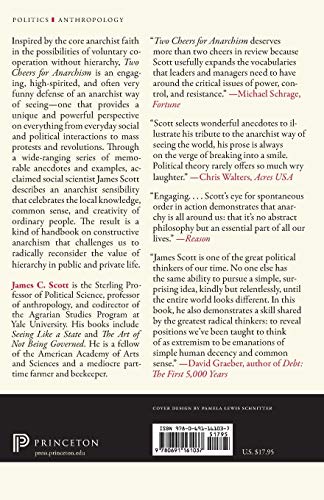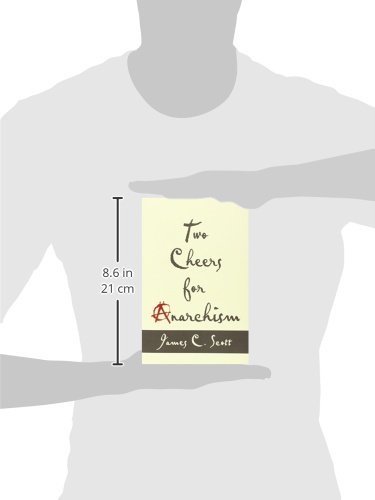Customer Services
Copyright © 2025 Desertcart Holdings Limited




Two Cheers for Anarchism: Six Easy Pieces on Autonomy, Dignity, and Meaningful Work and Play
N**S
A New Cookbook for Anarchists
"[T]he great emancipatory gains for human freedom have not been the result of orderly, institutional procedures but of disorderly, unpredictable, spontaneous action cracking open the social order from below." Thus concludes James C. Scott's brief celebration of the joy and necessity of anarchism, Two Cheers for Anarchism, (Princeton University Press: Princeton, 2012). Of course, Scott is right. Who foresaw the collapse of the Berlin Wall, the Arab Spring, the Occupy protests, or, most recently, the groundswell of popular protest in Brazil? When, one wonders, will the damn of restraint break in the United States to shatter what is rapidly becoming an economic caste system? Scott is an unlikely proponent of anarchism. He's a tenured professor of political science and anthropology at Yale University. There's something counterintuitive about an academic preaching chaos. Isn't he the intellectual equivalent of a trust-fund baby - living free and easy off the unearned income of his university's generous endowment? Such thinking reflects a misunderstanding of anarchism. Anarchism is not disorder for disorder's sake. It is a rejection of the status quo as inadequate to meet the necessities of the time. It is the outcast forever and always challenging the orthodoxies of his time. It is the outsider saying to those confidently sharing the glow of inclusion: "Not so fast. There are things your ideals do not explain. Your rhetoric doesn't match the reality of my life." Anarchism is David saying to Goliath, "Do you feel my pain? No? Then feel this rock." The great enemies of human freedom are the ideals and ideologies that seek to blind men and women to what they see all around them. Hence, we celebrate freedom in the United States while housing more men and women in prisons than any other nation on earth. We sing songs of equality while the rich get richer, and poor, well, they're just dropped from statistical reports - did you know that unemployment numbers reflect the number of folks looking work. Those who have dropped out don't count. They are our disappeared. Listen to Scott describe the crayons politicians and mainstream journalists use to color over the rough edges of life: "The natural impulse to create a cohesive narrative to account for our own actions and lives, even when those lives and actions defy any coherent account, casts a retrospective order on acts that may have been radically contingent." In other words, we create the order we need by choosing to see what we report. The anarchist's voice is the demand of the powerless to be heeded. The anarchists "willingness to break the law [is] not so much a desire to sow chaos as a compulsion to instate a more just legal order," Scott writes. The anarchist is a shriek in a convent, protesting that solitary devotion to the holy comes at a profane cost. Tired of the meaningless charade of Barack O'Bush and John Boehner, two squawk boxes pissing passed one another on the nightly news? "The brutal fact of routine, institutionalized liberal democratic politics is that the interests of the poor are largely ignored until and unless a sudden and dire crisis catapults the poor into the streets." The insiders see no reason to change the rule of the game so long as it works for them. It is only when the outsiders force issues that real change occurs. Decades of "trickle down" economics has yielded only huge deficits, plutocrats and corporations too big to fail. Take a drive through the Midwest sometime and see what's left of the middle class. Scott's been a student of the dispossessed around the world for a scholarly lifetime, studying peasant resistance in Southeast Asia. The point of this little book is that anarchism has a role not just in what we used to call the Third World. The simple art of lifelong resistance to structures that do not work - "[q}uiet, unassuming, quotidian insubordination" - is becoming a necessary way of life in this the best of all possible worlds. You can bring a colossus to its knees by acts of "silent, dogged resistance, withdrawal and [the] truculence of ordinary people." This ordinary revolt can be more effective than revolutionary violence, he writes. Is Edward Snowden a traitor? Perhaps to the ruling class. To many others he represents something else. He understood the rules of the game the state now plays in the name of security. But security for whom, and at what costs? Snowden stepped outside the restraint of the law to demonstrate a larger truth - the contempt of big government and big corporations for ordinary people. Did you see the angry mug of the NSA's General Keith Alexander boasting how the surveillance state had saved us from so many terrorists attacks? He looked like a hungover J. Edgar Hoover grousing about all the communists who are infiltrating our schools, the government, the movies, and, well ... the very space beneath our beds. Scott's simple little book does much to rehabilitate anarchism. Forever and always there will be conflict between the individual and group. Watch any pack of animals and you'll see order break down from time to time, the outlier either brought to heel, or driven away. The human kind is no different; we're just more creative, and destructive, in how we go about satisfying the imperatives of survival. There will always be simmering discontent: Civilization is a work in progress. Anarchism is no more than the means by which ordinary force those in power to heed the voice of even the least advantaged. God save anarchism.
F**B
Anarchism gets practical
The author of Against the Grain is here essaying (a French word that has kin with the English expression “trial balloon”) on anarchism. Really practical stuff, with ideas about why and when we should break laws, utilize violence (the scream of the silenced), and on the practice of solidarity. Along the way, we get the idea that, contrary to almost all histories, life is messy, conditional, improvisational and that, in fact, we are all minor anarchists inasmuch as we communitarianly aide and abet one another—and that petty anarchism is, alas, also one of the ways the capitalist ecology cements us into seemingly eternal roles.
N**E
Three Cheers
"Two Cheers for Anarchism" is a thoughtful book of loosely-connected essays on a common theme: namely, that big hierarchical institutions invariably end up warping human values and diminishing human beings. Whether the institution is a public agency, a school, a big capitalist firm, the military, a centrally planned economy, or whatever, if it is run like a dictatorship, then it will produce cautious, deferential conformists, who will exercise autonomy, if at all, mainly through acts of quiet sabotage. The book ranges widely -- topics include city planning, military desertion, shirking, the petite bourgeoisie, and the SAT -- and the discussion is lively and well-informed. All small-"a" anarchists will enjoy it.
D**S
Scott is an amazing original. This is probably his most accessible non-academic ...
Scott is an amazing original. This is probably his most accessible non-academic book. As he quickly points out it is not really about anarchism, certainly not anarchist political thought or philosophy. It is a series of personal reflections on independence and its enemies based on the author's life experiences, history, and knowledge about agrarian peasants/subsistence agriculture-based communities. It reads like another angle on the same insights of countless other wise men, from Ivan Illich to Wendell Berry. If you're familiar with thinkers like that, you may not learn much that is "new" to you here, but it will give you another wise man's personal perspective on simple wisdom we need to be reminded of more than to learn as bits of information or knowledge.
J**R
Seeing Like a State - Condensed
It's hard to only give this 3 stars - it really was quite good.If I had not read Seeing Like a State first, this would probably have gotten 5 stars. If you HAVE read Seeing Like a State, there is not much new information or insight in this book. I'd say that the entire first half is a recap of Seeing Like a State. The second half does have a few new insights, but it's mostly a different angle of the same topics already covered.If you have NOT read Seeing Like a State, I think you will like this a lot.
D**E
Interesting examples
The author makes a few simple points - reality is messier than its representation, rulers like to control their subjects -- with amusing examples. The author then implies that this is all a plot by evil authorities (authority being inherently evil), taking himself the role of simplifying, ordering authority for his own benefit.
M**S
my world view took a beating at the hands of this book!
Challenging ideas in a short, accessible format!Four stars for the accessible and pleasant way the author challenged my world view. I recommend this book for anyone interested in historical narratives, organization of governance from smallest communities to largest states and those trying to make sense of the meta narratives being wielded like broadswords this and every political seasons. I will not think about social and political change in the same way from this point forward!Five stars would have required suggested prescriptions for addressing some of the issues raised. Nevertheless, I heartily recommend this book to all those whose curiosity for how social order proceeds ( or not).
A**S
Anarchism as common sense and common practice.
Makes many interesting comments about how very many everyday experiences and habits are reflections of 'anarchist principles/ideas. I thought that this tangential viewing of anarchist ideas I was very interesting.
M**O
Pleasant read
This book was not what I was expecting, but I liked it nevertheless. It consits of a set of essays about different aspects and advantages of anarchism, using an agreable, clear and sometimes funny prose. I would note, however, that the author's view of anarchism is mainly that of just lack of central authority, which I found a little bit reductive.It is written in a very friendly, if somewhat academic, tone, instead of the typical angered style of anarchist literature.
E**N
top!
es ist grundsaetzlich unmoeglich der wichtigkeit von Scott zu ueberschaetzen, wenn... mann bereit ist wahrheit zu bevorzuegen ueber realitaet.
D**Y
Too easy?
There's something about this book that reminds me of Peter Mayle's "A Year in Provence." Like Mayle, the author acts like a genial tour guide to the anarchist "squint," as he calls it, where we meet a gallery of characters in different locations and times. There was a nagging doubt, though: Where's the militancy? Nevertheless I recommend "Two Cheers" as an enjoyable read.
J**T
Three Stars
Accessible for folks who hold superficial/mainstream-media-informed notions of anarchism.
Trustpilot
2 weeks ago
4 days ago